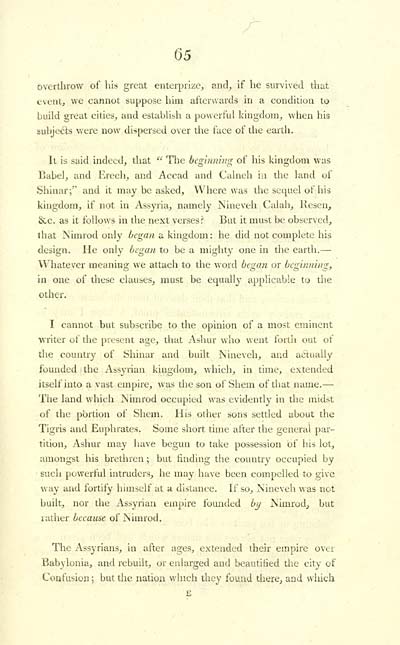Blair Collection > Celtic researches, on the origin, traditions & language, of the ancient Britons
(155)
Download files
Complete book:
Individual page:
Thumbnail gallery: Grid view | List view

Ö5
overthrow of his great enterprize, and, if he survived that
event, we cannot suppose him afterwards in a condition to
build great cities, and establish a powerful kingdom, when his
subjects were now dispersed over the face of the earth.
It is said indeed, that " The beginniiig of his kingdom was
Babel, and Erech, and Accad and Calneh in the land of
Shinar;" and it may be asked. Where was the sequel of his
kingdom, if not in Assyria, namely Nineveh Calah, Resen,
&c. as it follows in the next verses? But it must be observed,
that Nimrod only ùegan a kingdom: he did not complete his
design. He only began to be a mighty one in the earth. —
Whatever meaning we attach to the word began or beginnùìg,
in one of these clauses, must be equally applicable to the
other.
I cannot but subscribe to the opinion of a most eminent
writer of the present age, that Ashur who went forth out of
the country of Shinar and built Nineveh, and actually
founded the Assyrian kingdom, which, in time, extended
itself into a vast empiie, was the son of Shem of that name. —
The land which Nimrod occupied was evidently in the midst
of the portion of Shem. His other sons settled about the
Tigris and Euphrates. Some short time after the general par-
tition, Ashur may have begun to take possession of his lot,
amongst his brethren ; but finding the country occupied by
such powerful intruders, he may have been compelled to give
way and fortify himself at a distance. If so, Nineveh Avas not
built, nor the Assyrian empire founded bj/ Nimrod, but
rather because of Nimrod.
The Assyrians, in after ages, extended their empire over
Babylonia, and rebuilt, or enlarged and beautified the city of
Confusion ; but the nation which they found there, and which
Ε
overthrow of his great enterprize, and, if he survived that
event, we cannot suppose him afterwards in a condition to
build great cities, and establish a powerful kingdom, when his
subjects were now dispersed over the face of the earth.
It is said indeed, that " The beginniiig of his kingdom was
Babel, and Erech, and Accad and Calneh in the land of
Shinar;" and it may be asked. Where was the sequel of his
kingdom, if not in Assyria, namely Nineveh Calah, Resen,
&c. as it follows in the next verses? But it must be observed,
that Nimrod only ùegan a kingdom: he did not complete his
design. He only began to be a mighty one in the earth. —
Whatever meaning we attach to the word began or beginnùìg,
in one of these clauses, must be equally applicable to the
other.
I cannot but subscribe to the opinion of a most eminent
writer of the present age, that Ashur who went forth out of
the country of Shinar and built Nineveh, and actually
founded the Assyrian kingdom, which, in time, extended
itself into a vast empiie, was the son of Shem of that name. —
The land which Nimrod occupied was evidently in the midst
of the portion of Shem. His other sons settled about the
Tigris and Euphrates. Some short time after the general par-
tition, Ashur may have begun to take possession of his lot,
amongst his brethren ; but finding the country occupied by
such powerful intruders, he may have been compelled to give
way and fortify himself at a distance. If so, Nineveh Avas not
built, nor the Assyrian empire founded bj/ Nimrod, but
rather because of Nimrod.
The Assyrians, in after ages, extended their empire over
Babylonia, and rebuilt, or enlarged and beautified the city of
Confusion ; but the nation which they found there, and which
Ε
Set display mode to: Large image | Transcription
Images and transcriptions on this page, including medium image downloads, may be used under the Creative Commons Attribution 4.0 International Licence unless otherwise stated. ![]()
| Early Gaelic Book Collections > Blair Collection > Celtic researches, on the origin, traditions & language, of the ancient Britons > (155) |
|---|
| Permanent URL | https://digital.nls.uk/75765585 |
|---|
| Description | A selection of books from a collection of more than 500 titles, mostly on religious and literary topics. Also includes some material dealing with other Celtic languages and societies. Collection created towards the end of the 19th century by Lady Evelyn Stewart Murray. |
|---|
| Description | Selected items from five 'Special and Named Printed Collections'. Includes books in Gaelic and other Celtic languages, works about the Gaels, their languages, literature, culture and history. |
|---|

